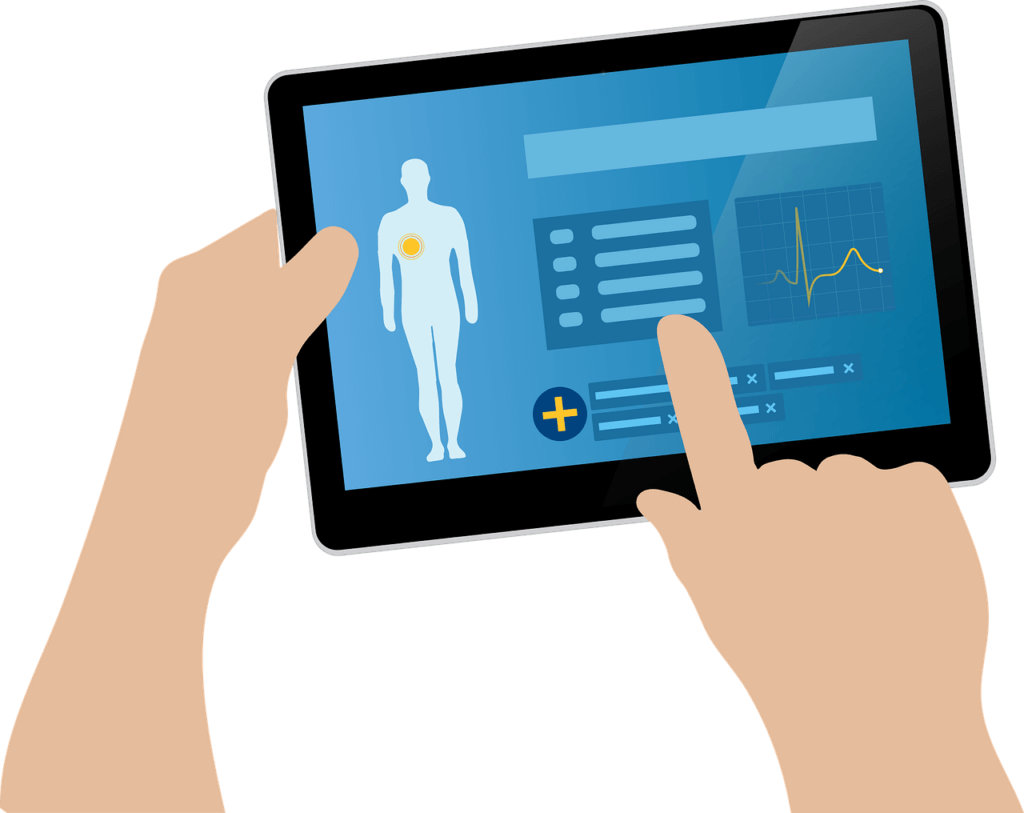mHealth for Mid-Size Companies: What Every Business Owner Should Know
After reading this article, you’ll:
- Grasp the transformative potential of mHealth for mid-size companies, positioning it as more than just a trend but a vital tool for employee wellness and business growth.
- Recognize the intricacies of mHealth app development, from platform selection to regulatory compliance, enabling a more informed approach to custom solutions.
- Be equipped with practical strategies for successful collaboration with app developers, ensuring a seamless journey from ideation to post-launch support

Health has taken a front-seat position with the introduction of mHealth, or mobile health. This technology-driven approach allows users to monitor and manage their health through mobile devices such as smartphones, tablets, and wearables. The past few years have witnessed a remarkable rise in the adoption of mHealth solutions, making them an integral part of modern healthcare management.
For mid-size companies, mHealth isn’t just a buzzword but a significant opportunity. It promises not only improved health outcomes for employees but also operational and financial benefits for the business itself. In the sections that follow, we’ll delve deeper into what mHealth is and why it’s becoming indispensable for businesses of this scale.
Understanding mHealth
 Definition and basics of mHealth: At its core, mHealth refers to the medical and public health practice supported by mobile devices. It encompasses a vast range of services, from simple text reminders for medication to sophisticated health monitoring apps leveraging AI and Big Data. With the ubiquity of smartphones and the global push towards a more digitized health infrastructure, mHealth has emerged as a key player in delivering efficient healthcare solutions.
Definition and basics of mHealth: At its core, mHealth refers to the medical and public health practice supported by mobile devices. It encompasses a vast range of services, from simple text reminders for medication to sophisticated health monitoring apps leveraging AI and Big Data. With the ubiquity of smartphones and the global push towards a more digitized health infrastructure, mHealth has emerged as a key player in delivering efficient healthcare solutions.
Benefits of mHealth solutions in today’s digital age: The advantages of mHealth are manifold. For individuals, it offers convenience, timely interventions, and personalized health insights. But on a larger scale, mHealth paves the way for a more connected health ecosystem, reducing the burden on traditional healthcare infrastructure. It brings about efficient data management, quicker diagnoses, remote patient monitoring, and a more patient-centric approach. Additionally, in times of global health crises, mHealth solutions can play a pivotal role in information dissemination and population health management.
Why mHealth is Relevant for Mid-Size Companies
Employee wellness and productivity: A healthy employee is often a more productive one. mHealth solutions, by offering tools for regular health checks, fitness tracking, mental wellness programs, and more, can directly contribute to an employee’s overall well-being. This, in turn, can lead to reduced absenteeism, increased work satisfaction, and better job performance.
Cost savings in health and well-being programs: Traditional health and wellness programs can be expensive to implement and maintain. mHealth apps and platforms, on the other hand, can provide scalable and customizable solutions that fit a company’s specific needs and budget. Over time, this can translate to significant savings while still providing top-notch health benefits.
Competitive advantage in the talent market: In the race to attract and retain the best talent, companies need to offer more than just competitive salaries. A robust mHealth program can be a significant differentiator, showcasing the company’s commitment to its employees’ health and well-being.
Real-time health monitoring and data-driven decisions: The beauty of mHealth lies in its real-time data collection and analysis capabilities. For companies, this means a goldmine of health data that can be analyzed to make informed decisions. Whether it’s tweaking a wellness program based on user engagement or identifying common health issues within the workforce to provide targeted interventions, mHealth offers insights like never before.
mHealth isn’t merely a trend but a paradigm shift in how businesses perceive and approach employee health. With clear benefits ranging from improved wellness to tangible cost savings, it’s no wonder that mid-size companies are hopping on the mHealth bandwagon with enthusiasm.
Key Considerations for Business Owners
 As mHealth solutions begin to permeate the business environment, especially for mid-size companies, there are crucial aspects that every business owner must keep in mind:
As mHealth solutions begin to permeate the business environment, especially for mid-size companies, there are crucial aspects that every business owner must keep in mind:
Data privacy and security concerns: Given that mHealth platforms handle sensitive health information, ensuring that data remains confidential and protected from breaches is paramount. It’s vital to adopt best practices in data security and be compliant with relevant data protection laws.
Integration with existing health programs or platforms: For companies with existing health programs, the challenge lies in integrating these with new mHealth solutions seamlessly. This can mean ensuring data transfer without duplication, maintaining historical health records, and ensuring user familiarity.
Customizability to fit company-specific needs: Every business is unique, and so are its health and wellness needs. An effective mHealth solution should be adaptable enough to reflect the company’s objectives, culture, and specific health challenges.
Scalability as the company grows: Mid-size companies, often on a growth trajectory, need solutions that can grow with them. This implies that the mHealth solutions they adopt should handle an increasing number of users and integrate newer functionalities without a complete overhaul.
ROI and cost-benefit analysis: As with any investment, business owners should have clarity on the potential returns from mHealth implementations. This could be in the form of reduced healthcare costs, improved employee productivity, or enhanced brand image.
Introduction to mHealth App Development
For businesses keen on fully harnessing the potential of mHealth, sometimes off-the-shelf solutions don’t quite cut it. Here’s where custom mHealth app development comes into play:
Why a custom mHealth app might be the right solution for your business: A tailor-made app ensures features align perfectly with a company’s objectives. It offers branding opportunities and ensures a unique user experience that resonates with the company’s ethos.
Basic steps in the app development process: This typically begins with ideation, followed by defining specifications, choosing a platform, designing, developing, testing, and finally deploying the app. Regular updates based on feedback are crucial post-deployment.
Factors to Consider in mHealth App Development
Developing an mHealth app is not a straightforward task; it’s an intricate process that requires meticulous attention to detail:
Platform Selection: iOS vs Android vs Cross-platform: The decision here largely depends on the primary audience. While iOS might be popular in certain regions and demographics, Android holds a significant market share globally. Cross-platform development ensures wider reach but may involve trade-offs in terms of performance and user experience.
User Experience (UX) and User Interface (UI): An intuitive and user-friendly design is key to ensuring that employees regularly use the app. A cluttered or complex interface can deter users, undermining the app’s primary objectives.
Features and Functionality: Core functionalities could include real-time health monitoring, push notifications for medication or workout reminders, and health data analytics. The choice of features should align with the company’s health objectives.
Integration Capabilities: The app should seamlessly integrate with other applications, wearables, and enterprise systems to ensure a cohesive health ecosystem. This could mean syncing with fitness trackers or integrating with HR software for health-driven incentives.
Regulatory Compliance: Ensuring the app adheres to health data standards, such as the Health Insurance Portability and Accountability Act (HIPAA) in the U.S., is non-negotiable. Compliance safeguards the company from legal repercussions and reinforces trust among users.
In essence, while the prospect of mHealth holds immense promise for mid-size companies, its successful adoption hinges on careful consideration of the above factors. A well-implemented mHealth solution can transform the health and well-being landscape of a company, delivering tangible benefits both in terms of employee wellness and bottom-line results.
Working with App Developers: Tips for Success
Embarking on the journey of mHealth app development can be exhilarating, but also overwhelming. Partnering with the right app developers can make all the difference. Here are some tips to ensure a fruitful collaboration:
Communicating your business needs clearly: Before diving into the development process, take the time to articulate your business objectives, desired functionalities, and any specific design aesthetics. A clear project brief can serve as a foundation for all subsequent development stages.
Setting a realistic budget and timeline: App development, especially in the mHealth domain, can be intricate. It’s crucial to set aside a realistic budget that accounts for unforeseen challenges. Similarly, while everyone desires a swift turnaround, quality takes time. Establish a timeline that allows for unexpected hiccups, ensuring the end product isn’t rushed.
The iterative process: alpha, beta testing, and feedback loops: App development isn’t linear. After the initial development (alpha stage), a select group of users should test the app (beta stage). Their feedback can uncover glitches or areas for improvement that may have been overlooked. This iterative process, cycling through feedback and revisions, ensures the final product is polished and user-friendly.
Post-launch support and updates: The app’s launch isn’t the end but a new beginning. Regular updates, based on user feedback and technological advancements, are vital. Moreover, ensure your developer provides post-launch support to address any issues that arise.
Business owners are encouraged to explore the world of mHealth, not as a mere trend but as a strategic move to usher their businesses into a future where health and work go hand in hand. In an era where well-being is paramount, mHealth is not just an option, but an imperative.





